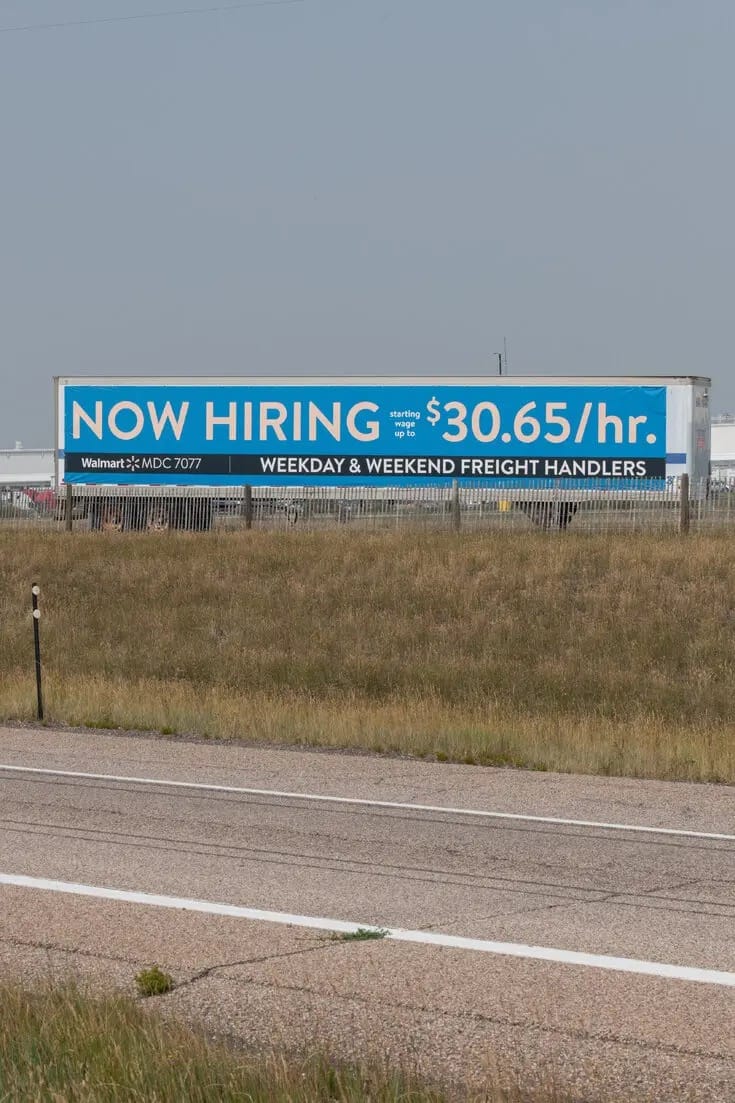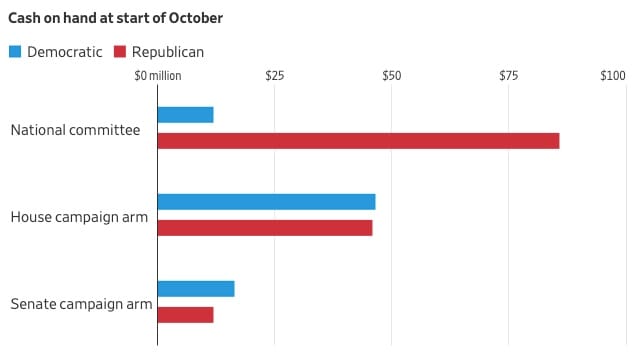Top 5 US news stories
October 22 2025

Doubts Rise Over Value of College Degree
ACA Costs Soar as COVID-Era Subsidies Expire
RNC Vastly Outpaces DNC in Fundraising
Young Chinese Workers Redefine Careers
Analysis: Speculation Mounts Over Xi's Succession

…US GOVERNMENT SHUTDOWN ENTERS 22nd DAY…
Doubts Rise Over Value of College Degree
On the outskirts of Wyoming’s capital, two advertisements about a minute apart offered starkly different paths. A nonprofit group’s billboard promoted a way to earn money for college. The other, from Walmart, dangled pay exceeding $30 an hour. The dueling choices underscored a fundamental tension for the nation’s teenagers and adults alike, one that has become vivid in the Trump era: Is college something all Americans need? For decades, it was close to an article of faith among education leaders, scholars and politicians, regardless of political ideology, that most people should go to college. But in many places, most jobs do not require college degrees, and doubts over the value of higher education have metastasized as student debt has soared and the ranks of dropouts have grown. College has become a sharp dividing line in American life, and the disconnect between higher education’s promises and its sometimes-frustrating reality has helped fuel a conservative movement to upend academia. Over the last decade, though, nearly every state tried to get more people to earn a certificate or a degree after high school. Wyoming, which has just one public university, was among the states that bought into the campaign to push more of its residents toward higher education. Like most others, it made headway, but far less than it had hoped. And an uncomfortable question still lurks after seven years of trying to entice more students, even for people like Joe Schaffer, the Laramie County Community College president who both championed the state’s ambition and warned of the siren song of Walmart’s wages. “How do we make education much more relevant to the student?”
NYT
ACA Costs Soar as COVID-Era Subsidies Expire
Millions of Americans are already seeing their health insurance costs soar for 2026 as Congress remains deadlocked over extending covid-era subsidies for premiums. The bitter fight sparked a government shutdown at the start of October. Democrats refuse to vote on government-funding legislation unless it extends the subsidies, while Republicans insist on separate negotiations after reopening the government. Now lawmakers face greater pressure to act as Americans who buy insurance through the Affordable Care Act are seeing, or about to see, the consequences of enhanced subsidies expiring at the end of the year. Healthcare.gov — the federal website used by 28 states — is expected to post plan offerings early next week ahead of the start of open enrollment in November. But window shopping has already begun in most of the 22 states that run their own marketplaces, offering a preview of the sticker shock to come. Premiums nationwide are set to rise by 18 percent on average, according to an analysis of preliminary rate filings by the nonpartisan health policy group KFF. That, combined with the loss of extra subsidies, have left Americans with the worst year-over-year price hikes in the 12 years since the marketplaces launched.
Washington Post
RNC Vastly Outpaces DNC in Fundraising
The Republican National Committee heads into the year before the midterm election with a significantly bigger bank balance than the Democratic National Committee, a reflection of the GOP’s dominance in Washington and the minority party’s ongoing struggles. The gap is a warning sign for Democrats as some of their donors remain skeptical of the party’s direction and of whether there is a viable plan to win again. At one point earlier this year, the DNC reached out to big donors to host a San Francisco-area fundraiser headlined by former Vice President Kamala Harris. Most of the donors rejected the request, according to several people familiar with the conversations. Upon receiving the invitation, one replied with a profanity-laced rejection. Others said they didn’t want to give to the party until it produced substantive plans to win elections. Those who declined told the national party they had commitments and couldn’t make it work. The DNC ultimately found a donor who hosted the event, but it raised less than organizers had hoped. The latest fundraising totals released this week show the Democrats’ weakness. The RNC had receipts of $10.7 million in the most recent month and $86 million in cash reserves as it started October, compared with $10.3 million and about $12 million for the DNC, respectively.

WSJ
Young Chinese Workers Redefine Careers
The Chinese dream once followed a simple formula: move to a big city, work hard, and buy a home. That model, once a reliable engine of progress in China, is breaking down after the collapse of the housing market in 2021, which set off an ongoing economic downturn. Today, many workers are opting out of the old system and finding new careers in China’s digital gig economy — and in the process, redefining what work looks like. Across the country, young people are struggling to find the kind of lucrative office jobs that were once common after college, and some are rejecting the pressure to pursue prosperity at all costs, and instead choosing to do as little as possible. Meanwhile, China’s population is growing older, and blue-collar jobs are becoming increasingly attractive. These shifts are playing out in surprising ways because of the Chinese internet. With a smartphone and social media, workers across the country are tapping into online trends and investing in themselves, creating a new generation of digital entrepreneurs who are making money and building careers on their own terms.
NYT
Analysis: Speculation Mounts Over Xi's Succession
With the world’s attention riveted on the on-again, off-again trade war between the United States and China, it can be easy to forget that Chinese President Xi Jinping, just like his American counterpart, Donald Trump, has domestic preoccupations that are far more front of mind for him than the ongoing trade spat. In fact, Xi this week is presiding over the Fourth Plenum of the 20th Central Committee, which will be an important milestone in this Central Committee’s political calendar. When the Politburo held its typical month end meeting in September, it announced the timing for the Plenum and said its agenda would be focused on approving the draft of the 15th Five-Year Plan, the Chinese Communist Party’s (CCP) strategic economic guidance blueprint for the period 2026-2030. Judging solely from the few teasers the government has released via central media, that document is sure to have profound implications for both China’s domestic development and for its trading relationships with the United States and many other countries. The conventional wisdom says Xi will rule for life. His chitchat with Russian President Vladimir Putin on a hot mic at last month’s military parade in Beijing calling septuagenarians like them children and referencing living to 150 obviously did little to challenge that conviction. And yet, there is a certain schizophrenia in the commentariat’s discussion of Xi and the succession. For example, his silence on a handover strategy was declared a looming crisis back in 2021, but China watchers still axiomatically claim he wants another term in 2027 with no transition plan in mind. Unless Xi is a pure narcissist, however, that level of alarm seems unmerited. Like his overegged “bromance” with Putin, it partly derives from foreign hyperbole about Xi as another Mao or Stalin, two proper megalomaniacs. Analysts frequently suggest he is mirroring their smothering personality cults and capricious purges, making dying in office a next logical homage. Never mind that Xi follows smooth policy lines while theirs veered sharply. He is calculating where they were whimsical. His leadership philosophy was forged by tumult and disgrace when theirs took shape in triumph—and the list of dissimilarities goes on and on. The point is that Xi frequently is more creative—and might even prove more magnanimous—than his foreign students often give him credit for.
Sinocism

October 22 1797: First parachute jump is made over Paris
The first parachute jump of note is made by André-Jacques Garnerin from a hydrogen balloon 3,200 feet above Paris. Leonardo da Vinci conceived the idea of the parachute in his writings, and the Frenchman Louis-Sebastien Lenormand fashioned a kind of parachute out of two umbrellas and jumped from a tree in 1783.

We are temporarily pausing our podcasts as we revamp our app so any article can be read as audio
Found a mistake? Have a news tip or feedback to share? Contact our newsroom using the button below:
citizen journal offers three flagship products: a daily national news summary, a daily Kansas news summary, and local news and school board summaries from 25 cities across 5 states. Use the links in the header to navigate to national, kansas, and local coverage. Subscribe to each, some, or all to get an email when new issues are published for FREE!
Brought to you by (click me!)





Sources
- https://www.nytimes.com/2025/10/22/us/value-of-higher-education-attainment-rates-graduation.html
- https://www.washingtonpost.com/health/2025/10/22/obamacare-aca-enrollment-price-increases/
- https://www.wsj.com/politics/policy/democratic-donors-sit-on-sidelines-as-party-schism-persists-b81b1247?mod=hp_lead_pos3
- https://www.nytimes.com/interactive/2025/10/21/world/asia/china-work-force.html?unlocked_article_code=1.vU8.hI15.MUEamyfcnsUI&smid=url-share
- https://sinocism.com/p/forever-xi-jinping-perhaps-not?r=d9vo5&utm_medium=ios&triedRedirect=true

